Dear Sister has sent me this email again, so she must be trying to convey something. It’s one of those glurgy stories where the wily student turns the tables on the Atheist Professor.
Aah, the college professor. I don’t know why people love to bash on them. Maybe they got bad grades in college. Or possibly they had their faith challenged by someone smart and it frightened them. Now they’re hostile to Book Larnin’. Or perhaps there’s this malaise among some religious people, like science is making great strides in understanding the world and the universe, and they’re just stuck there in church like every other week, sucking in the vacuity. They understand that science and reason is in opposition to their god (which is why they warn each other to be cautious about it), but they can’t figure out what to do about it, and it’s frustrating. They could take on the problem, but that might be hard. It’s so much easier to forward an email instead.
Goodness knows this is all I ever do in class — argue with students about god — especially because we aren’t busy doing any actual course material. I’ve got free time to burn, which is why I often take the opportunity to belittle my students about their religious beliefs. And they love it — it’s why they worship lecturers like gods, and immediately take on their slightest opinions.
The actual email is very long and boring, so I’m putting it below the jump, with my comments.
Subject: Science vs God…Very interesting
Long, but lively and stimulating:) & WONDERFUL
Science vs God…Very interesting
“Let me explain the problem science has with Jesus Christ.” The atheist professor of philosophy pauses before his class and then asks one of his new students to stand.
I start every lecture this way, except I’m plunging a dagger into a teddy bear. But I’m always very careful to make sure there are no Marines in my class. One time I challenged a god to knock me over. It didn’t go well.
“You’re a Christian, aren’t you, son?”
Yes sir,” the student says.
“So you believe in God?”
“Absolutely.”
“Is God good?”
“Sure! God’s good.”
“Is God all-powerful? Can God do anything?”
“Yes.”
“Are you good or evil?”
“The Bible says I’m evil.”
Imagine that your holiest book, what you consider to be the source of all divine knowledge, tells you you’re evil. That’s quite the head trip.
The professor grins knowingly. “Aha! The Bible!” He considers for a moment.
“Here’s one for you. Let’s say there’s a sick person over here and you can cure him. You can do it. Would you help him? Would you try?”
“Yes sir, I would.”
“So you’re good…!”
“I wouldn’t say that.”
“But why not say that? You’d help a sick and maimed person if you could.
Most of us would if we could. But God doesn’t..”
The student does not answer, so the professor continues. “He doesn’t, does he? My brother was a Christian who died of cancer, even though he prayed to Jesus to heal him. How is this Jesus good? Hmmm? Can you answer that one?”
The student remains silent.
“No, you can’t, can you?” the professor says. He takes a sip of water from a glass on his desk to give the student time to relax.
No, he can’t, can he? Ability implies responsibility. Any of us would help, because we’re good moral beings. But the god of the apologists fails to do so because it would somehow render our existence meaningless, or something.
“Let’s start again, young fella, is God good?”
“Er…yes,” the student says.
“Is Satan good?”
The student doesn’t hesitate on this one. “No.”
“Then where does Satan come from?”
The student : “From…God…”
“That’s right. God made Satan, didn’t he? Tell me, son. Is there evil in this world?”
“Yes, sir.”
“Evil’s everywhere, isn’t it? And God did make everything, correct?”
“Yes.”
“So who created evil?” The professor continued, “If God created everything, then God created evil, since evil exists, and according to the principle that our works define who we are, then God is evil.”
Without allowing the student to answer, the professor continues: “Is there sickness? Immorality? Hatred? Ugliness? All these terrible things, do they exist in this world?”
The student: “Yes.”
“So who created them?”
The student does not answer again, so the professor repeats his question. “Who created them? There is still no answer. Suddenly the lecturer breaks away to pace in front of the classroom. The class is mesmerized.
I’m mesmerised myself, but then what do I know? I thought that theodicy meant ‘theological idiocy’. Actually, maybe I’m not far wrong.
“Tell me,” he continues onto another student. “Do you believe in Jesus Christ, son?”
The student’s voice is confident: “Yes, professor, I do.”
The old man stops pacing. “Science says you have five senses you use to identify and observe the world around you. Have you ever seen Jesus?”
“No sir. I’ve never seen Him”
“Then tell us if you’ve ever heard your Jesus?”
“No, sir, I have not.”
“Have you ever actually felt your Jesus, tasted your Jesus or smelt your Jesus? Have you ever had any sensory perception of Jesus Christ, or God for that matter?”
“No, sir, I’m afraid I haven’t.”
Never smelt your Jesus? What kind of Christian are you? Or is that some kind of bizarre euphemism?
“Yet you still believe in him?”
“Yes.”
“According to the rules of empirical, testable, demonstrable protocol, science says your God doesn’t exist. What do you say to that, son?”
“Nothing,” the student replies. “I only have my faith.”
“Yes, faith,” the professor repeats. “And that is the problem science has with God.
There is no evidence, only faith.”
So far, so good.
The student stands quietly for a moment, before asking a question of his own.
“Professor, is there such thing as heat?”
“Yes,” the professor replies. “There’s heat.”
“And is there such a thing as cold? asked the student.
“Yes, son, there’s cold too.”
“No sir, there isn’t.”
The professor turns to face the student, obviously interested. The room suddenly becomes very quiet.
The student begins to explain.
“You can have lots of heat, even more heat, super-heat, mega-heat, unlimited heat, white heat, a little heat or no heat, but we don’t have anything called ‘cold’. We can hit up to 458 degrees below zero, which is no heat, but we can’t go any further after that. There is no such thing as cold; otherwise we would be able to go colder than the lowest -458 degrees. Everybody or object is susceptible to study when it has or transmits energy, and heat is what makes a body or matter have or transmit energy. Absolute zero (-458 F) is the total absence of heat. You see, sir, cold is only a word we use to describe the absence of heat. We cannot measure cold. Heat we can measure in thermal units because heat is energy. Cold is not the opposite of heat, sir, just the absence of it.”
Silence across the room. A pen drops somewhere in the classroom, sounding like a hammer.
Why do they always write the professor like he’s a dumbass? I knew this one and I’m in linguistics, for criminy. (And just for the record, absolute zero is −459.67° F, but it’s hard to remember the details in a debate.)
“What about darkness, professor. Is there such a thing as darkness?”
“Yes,” the professor replies without hesitation. “What is night if it isn’t darkness?”
“You’re wrong again, sir. Darkness is not something; it is the absence of something. You can have low light, normal light, bright light, flashing light, but if you have no light constantly you have nothing and it’s called darkness, isn’t it? That’s the meaning we use to define the word. In reality, darkness isn’t. If it were, you would be able to make darkness darker, wouldn’t you?”
So what? He’s a professor of philosophy, not physics — cut him some slack.
The professor begins to smile at the student in front of him. This will be a good semester. “So what point are you making, young man?”
“Yes, professor. My point is, your philosophical premise is flawed to start with, and so your conclusion must also be flawed.” The professor’s face cannot hide his surprise this time. “Flawed? Can you explain how?”
“You are working on the premise of duality,” the student explains.. “You argue that there is life and then there’s death; a good God and a bad God. You are viewing the concept of God as something finite, something we can measure. Sir, science can’t even explain a thought.
And religion can? If anything is going to explain thought, it’ll be neuroscience and not revelation.
It uses electricity and magnetism, but has never seen, much less fully understood either one.. To view death as the opposite of life is to be ignorant of the fact that death cannot exist as a substantive thing. Death is not the opposite of life, just the absence of it.”
He’s a monist? Would many Christians agree with this? I thought Satan was necessary to keep the heat off of god for doing all those rotten things. As in “Oh, it’s not god’s fault. It’s his patsy, Satan.” Maybe a Christadelphian wrote this.
Just so I don’t lose track, let’s keep a list of things that do not exist:
Cold
Darkness
Evil
Death
Notice also that, since the previous student admitted that he was evil, he technically doesn’t exist.
“Now tell me, professor. Do you teach your students that they evolved from a monkey?”
“If you are referring to the natural evolutionary process, young man, yes, of course I do”
Of course he does. We’ve already established that he’s obnoxious and evil. Why wouldn’t he be pro-evolution?
“Have you ever observed evolution with your own eyes, sir?”
The professor begins to shake his head, still smiling, as he realizes where the argument is going. A very good semester, indeed.
Yes, you can observe evolution with your own eyes. Evolution has been observed in the lab.
“Since no one has ever observed the process of evolution at work and cannot even prove that this process is an on-going endeavor, are you not teaching your opinion, sir? Are you now not a just scientist, but a also a preacher?”
No.
The class is in uproar. The student remains silent until the commotion has subsided.
“To continue the point you were making earlier to the other student, let me give you an example of what I mean.”
The student looks around the room. “Is there anyone in the class who has ever seen the professor’s brain?”
The class breaks out into laughter.
“Is there anyone here who has ever heard the professor’s brain, felt the professor’s brain, touched or smelled the professor’s brain? No one appears to have done so. So, according to the established rules of empirical, stable, demonstrable protocol, science says that you have no brain, with all due respect, sir. So if science says you have no brain, how can we trust your lectures, sir?”
Now the room is silent. The professor just stares at the student, his face unreadable.
Finally, after what seems an eternity, the old man answers. “I guess you’ll have to take them on faith.”
Now the story has reached the pinnacle of dumbth. Which is not a thing; it is merely the absence of smartness.
If you’re not sure if there’s a brain in your head, I can reassure you: it’s very likely that you do. It’s not something you have to take on faith.
a. If you dissect a cadaver, you will observe a brain inside. You can repeat this experiment as many times as you like, for as many cadavers as you can find. We can then generalise to other humans, thus: humans have brains.
b. We can infer the existence of your brain by observing your behaviours. You can talk, breathe, move, and see. These are things that brains do. We know this because when people’s brains are damaged, they stop doing these things.
c. Some kinds of brain surgery have to be done when the patient is awake. If you have this kind of surgery, you can see your brain with the help of a couple of mirrors.
d. If you’re really not sure, come see me and I’ll get the band saw for some old school trepanation. I can guarantee that it won’t kill you because (as we’ve seen) death doesn’t exist. It’s just a word we use to describe your soon-to-be absence of life.
I’ve noticed a pattern when arguing with Christians. Their reliance on evidence is really selective. If you make a point, it’ll take extraordinary evidence for them to believe it. You could bring them all the evidence you like, and they still probably won’t believe you — as long as it’s something they don’t want to believe. But when they want to believe something, then they can be convinced by the merest hint of a possibility that it might be true. In fact, all they need to do is find out that an alternative belief might have a slight gap in it, and it sends them scampering back to whatever they want to believe, where it’s safe.
“Now, you accept that there is faith, and, in fact, faith exists with life,” the student continues. “Now, sir, is there such a thing as evil?”
Now uncertain, the professor responds, “Of course, there is. We see it every day. It is in the daily example of man’s inhumanity to man. It is in the multitude of crime and violence everywhere in the world. These manifestations are nothing else but evil.”
To this the student replied, “Evil does not exist sir, or at least it does not exist unto itself. Evil is simply the absence of God. It is just like darkness and cold, a word that man has created to describe the absence of God.
Why isn’t God just a word that man has created to describe the absence of evil? Apparently it only works one way.
God did not create evil. Evil is the result of what happens when man does not have God’s love present in his heart. It’s like the cold that comes when there is no heat or the darkness that comes when there is no light.”
The professor sat down.
On a whoopie cushion.
Pass this on if you have faith.
In summary, no one has seen the professor’s brain, therefore everything has to be taken on faith, including evolution. Science is just as poor a way of thinking as faith is, which presupposes that faith isn’t a good way of thinking. Cold isn’t an actual thing, and therefore God’s off the hook for any evil happening around the place because apparently evil and death don’t exist, although God somehow does.
Clear?
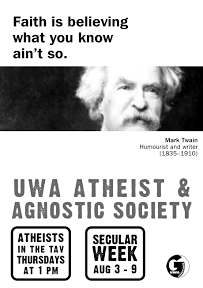

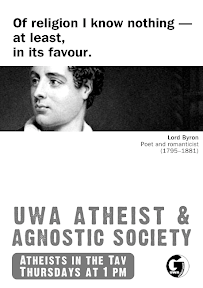

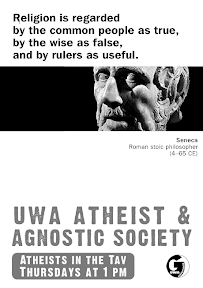
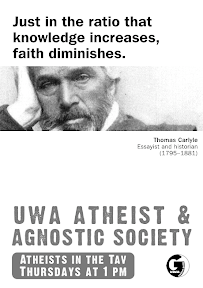

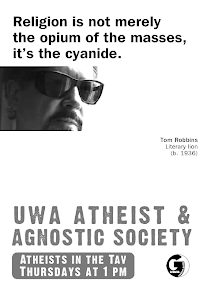
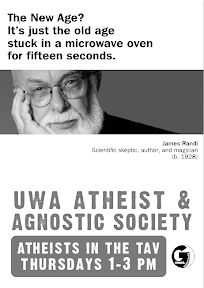


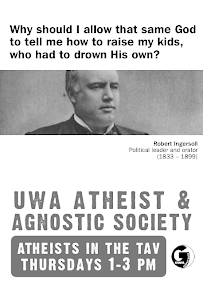

Recent Comments